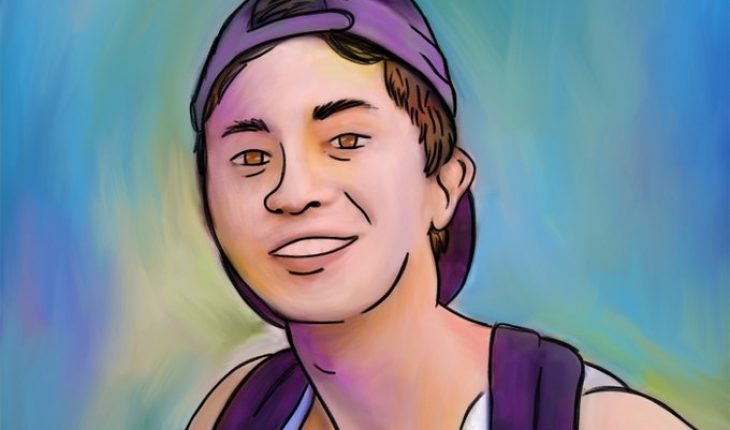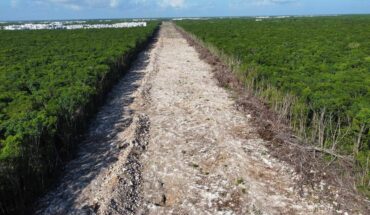The municipal president of Mérida, Renán Barrera, said that José Eduardo Ravelo Echeverría, a 23-year-old who died as a result of beatings and rape, was arrested for causing a disturbance to public order, since he was allegedly under the effect of drugs.
According to video recordings in the area, on June 21 the young man threw an object at a person from a taxi site in the historic center of the city, for which he was denounced and later arrested, as he was causing ‘disturbances to public order’.
“The police come at that moment, they approach the young man, they give themselves inconvenient status account in which he was, they decide to put him in the municipal police van, in the back,” Barrera said in an interview on the program. That is the way it is.
The elements proceeded to subdue and handcuff him, ‘without any violence’, and then transfer him, in a span of 6 to 10 minutes to the municipal police headquarters, a short distance from the Historic Center.
“There are also witnesses to the arrest, there are people who have stated what they saw and who confirm that there was under no circumstances or an act of torture at the time of getting into the vehicle and in what we can see on the cameras we do not see that there is aggravated torture or gang.”
Once in jail, Renán Barrera stressed that ‘being in an inconvenient state’ it was not possible to take his fingerprints, nor to make the entry protocol, since he had an ‘extremely aggressive’ behavior.
In view of this, the prison doctor verified him and certified that he was in a state of intoxication, the president reported, and that he also showed no signs of torture or signs of rape.
He was then admitted to his cell, where there were also surveillance cameras, and once there he vanished. Over the course of 24 hours, what the security cameras allegedly captured was Jose Eduardo ‘gradually regaining his physical condition.’
The next day, on July 22, he was released from prison at 11:00 a.m. – without having been able to testify before a judge at about 7:00 a.m. because he was ‘not in a position to articulate or verbalize’ – and headed back to the Government Palace, in the historic center of the Yucatan capital.
The municipal president said that from there he lost track and learned about him until two days later, when the police were notified about a complaint about the arrest of the young man.
“Of course we want the same thing as José Eduardo’s mother, that is to say that there is justice, but it is also important for everything that has been mentioned that he could have been arrested because of his sexual orientation, because of his physical appearance or because he is simply suspicious, because that is not the case and I think it is also worth it for us to specify these details,” Barrera concluded.
“You cannot be arrested without committing a crime”
In Mexico, the use of some substances is not a crime, Edith Olivares, executive director of Amnesty International Mexico, said in the same program, noting as troubling that the authorities’ narrative focuses on the state of José Eduardo.
“One person cannot be arrested if she has not committed a crime” olivares said.
The Director commented that in the report ‘False Suspicions’ published four years ago by Amnesty International, a number of cases of arbitrary detentions in the country were documented, and it was found that the arrests of people who are allegedly committing a crime by being apprehended, in reality, are not a real answer to face the crimes that are committed in the country, rather they are used by the authorities illegally, mainly against those who face historical situations of discrimination.
From Amnesty International, Olivares invited the young man’s family to be put at the center of the dialogue, and called on the authorities to respect the investigation process.that the information is not aired whether they have or not, it can be risky to the process and disrespectful to the victim.”
In Yucatan, several cases of arbitrary detentions have been documented for issues such as the use of blankets, substance use, or people who have certain traits, particularly indigenous people, Olivares said.
“There is a use of detention towards a group of people traditionally discriminated against, and that is a violation of human rights.”
#JusticiaParaJoséEduardo
On August 7, Yucatan authorities confirmed the apprehension of those allegedly responsible for the death of José EduArdo Ravelo Echavarría, a 23-year-old arrested, beaten and raped by state police.
The elements were charged with the crimes of aggravated homicide committed in a gang, aggravated rape and aggravated torture.
The events took place on 21 July when José Eduardo, originally from Veracruz, was arrested by municipal police in the center of Mérida.
According to what his mother, Dora María Ravelo Echeverría, told the local media, he was taken away for “looking suspicious,” although the young man assured them that he was there for a job interview.
A day later, he contacted his mother, who told him he had been beaten and sexually abused by officers. According to his testimony, the soldiers allegedly sexually abused Jose Eduardo in the patrol and again in the municipal jail.
On July 24, Dora María moved from Isla, Veracruz, to Mérida, to take her son to the hospital, where he was denied care.
According to el Diario de Yucatán and Quadratin, after Agustín O’Horán’s refusal to attend to José Eduardo, they went to the Attorney General’s Office of Yucatán to file a complaint of torture and rape, and of medical negligence against the hospital.
The serious state of health of the young man made the forensic doctor immediately order his transfer to the same hospital where in the first instance he had been rejected and there he remained hospitalized until he died on August 3. The reason was multiple organic obstruction syndrome and polytrauma.
After Dora Maria’s protest with her son’s coffin in front of the government palace, municipal president Renán Barrera said that the death of José Eduardo was being investigated, which he said was committed in ‘strange circumstances’.
With information from Así las Cosas.
What we do at Animal Politico requires professional journalists, teamwork, dialogue with readers and something very important: independence. You can help us continue. Be part of the team.
Subscribe to Animal Politico, receive benefits and support free journalism.#YoSoyAnimal





